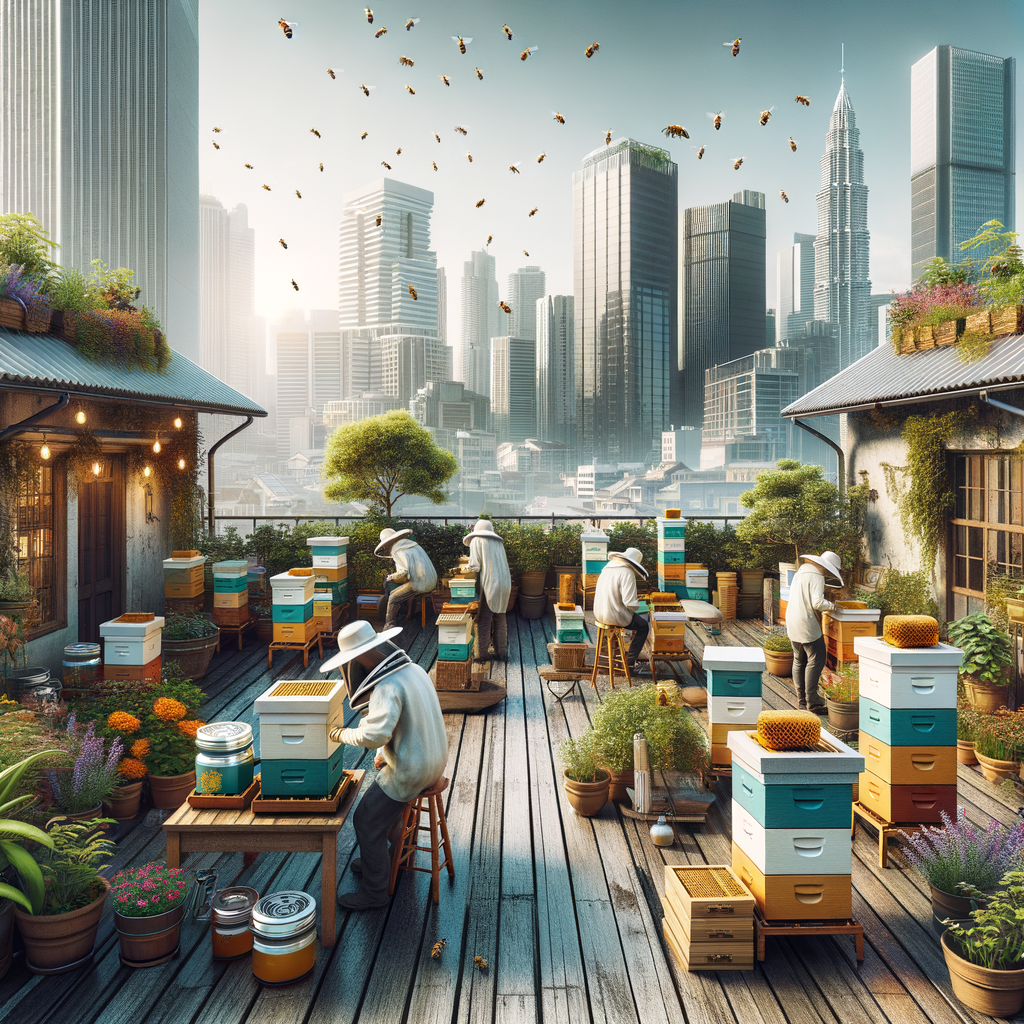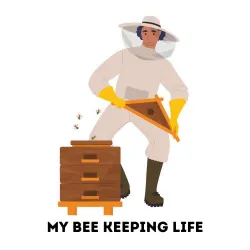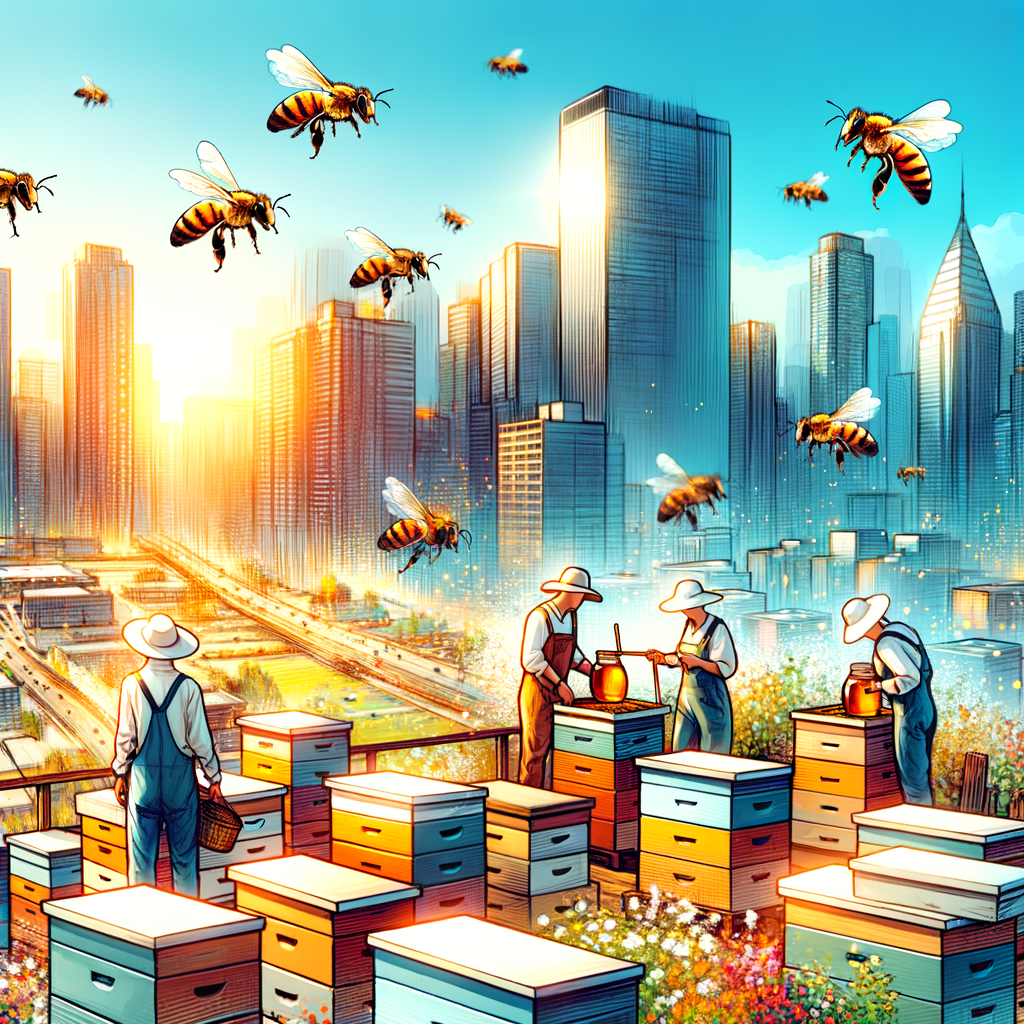
Introduction to Urban Beekeeping
Welcome to the fascinating world of urban beekeeping! This practice is not just about producing honey in a city setting. It’s a movement that contributes to the health of our environment and communities. Let’s dive deeper into what urban beekeeping is and how it has evolved over time.
- Definition of Urban Beekeeping
- History and Evolution of Urban Beekeeping
Urban beekeeping, also known as backyard beekeeping, is the practice of maintaining bee colonies in urban areas. This can be done in a backyard, on a rooftop, or even on a balcony. The main goal is to produce honey and other bee products for personal use or for sale. But it’s not just about the honey. Urban beekeeping also plays a crucial role in pollinating city gardens and parks, which helps our plants and flowers thrive.
Urban beekeeping has a rich history that dates back hundreds of years. In the past, people kept bees in cities out of necessity, as honey was a primary sweetener. As cities grew and industrialization took hold, urban beekeeping declined. But in recent years, it has seen a resurgence. This is due to a growing awareness of the importance of bees for our environment and food supply, and a desire to connect with nature in urban settings. Today, urban beekeeping is a popular hobby and an important part of sustainable urban agriculture.
Now that we’ve covered the basics, let’s explore the intersection of urban beekeeping and urban agriculture, and how you can get started with your own urban beekeeping journey.
The Intersection of Urban Beekeeping and Urban Agriculture
Urban beekeeping and urban agriculture are two practices that are closely intertwined. Let’s explore how they intersect and influence each other.
- Role of Urban Beekeeping in Urban Farming
- Impact of Urban Beekeeping on Urban Agriculture
Urban beekeeping plays a crucial role in urban farming. Bees are nature’s best pollinators. They help plants to reproduce by transferring pollen from the male parts of a flower to the female parts. This process, known as pollination, is vital for the growth of fruits and vegetables. In urban areas, where space is limited, bees can significantly increase the yield of urban gardens.
Urban beekeeping also contributes to biodiversity in cities. Bees help to pollinate not only cultivated plants but also wild flora, enhancing the urban ecosystem’s health and resilience.
Urban beekeeping has a positive impact on urban agriculture. As mentioned earlier, bees increase the yield of urban gardens by pollinating the plants. This leads to more productive urban farms, which can provide fresh, local produce for city dwellers.
Moreover, urban beekeeping can help to improve food security in cities. By boosting the productivity of urban farms, bees can help to ensure a steady supply of fresh produce, even in densely populated areas.
However, urban beekeeping also poses challenges. Bees need a diverse diet of pollen and nectar, which can be hard to find in cities. Urban beekeepers need to be mindful of this and take steps to provide their bees with a varied diet. This can include planting a variety of flowering plants in their gardens or providing supplemental feed for their bees.
In conclusion, urban beekeeping and urban agriculture are two practices that can greatly benefit each other. By supporting bees, we can enhance the productivity of urban farms and contribute to food security in cities. At the same time, urban agriculture can provide bees with the diverse diet they need to thrive.
Benefits of Urban Beekeeping
Urban beekeeping, also known as city or rooftop beekeeping, is a practice that has numerous benefits. These benefits are not only for the bees themselves but also for the environment, society, and economy. Let’s delve into these benefits one by one.
- Environmental Benefits
- Social Benefits
- Economic Benefits
Bees play a crucial role in our ecosystem. They are excellent pollinators, which means they help plants reproduce. This is incredibly important because about 75% of the world’s flowering plants rely on pollinators to reproduce. Urban beekeeping helps increase the bee population, thus improving the health of our environment. Plus, more bees mean more green spaces in cities, as they need places to forage. This can lead to the creation of more parks and gardens, making our cities greener and more beautiful.
Beekeeping can bring communities together. It’s a hobby that requires learning and collaboration, which can strengthen neighborhood bonds. Additionally, it can be a great educational tool for children, teaching them about nature, responsibility, and the importance of biodiversity. Urban beekeeping can also promote a sense of pride and accomplishment among city dwellers, as they contribute to environmental conservation and local food production.
Beekeeping can also have economic benefits. The honey produced by urban bees can be sold, providing a source of income. Additionally, urban beekeeping can create jobs, both directly and indirectly. For instance, beekeepers need equipment and supplies, which can stimulate local businesses. Furthermore, the increased pollination can boost the yield of local gardens and farms, potentially reducing food costs in the city.
In conclusion, urban beekeeping is a practice that offers numerous benefits. It’s a small step that can make a big difference in our environment, society, and economy. So, next time you see a bee buzzing around your city, remember that it’s doing a lot more than just making honey. It’s contributing to a healthier, more sustainable world.
Beekeeping for Beginners: Getting Started with Urban Beekeeping
Urban beekeeping is an exciting and rewarding hobby that not only benefits the environment but also provides sweet rewards in the form of honey. Here’s a simple guide to help you get started with urban beekeeping.
- Understanding the Basics of Beekeeping
- Choosing the Right Equipment
- Setting up Your Urban Apiary
Beekeeping, also known as apiculture, is the practice of maintaining bee colonies in man-made hives. Bees are vital for pollination, which helps plants to reproduce. As a beekeeper, you’ll be helping to boost local bee populations, which are under threat from habitat loss and disease.
Bees live in a colony, with each bee having a specific role. The queen bee lays eggs, worker bees collect food and maintain the hive, and drones are there to mate with the queen. Understanding these roles is key to successful beekeeping.
Before you start, you’ll need to invest in some basic beekeeping equipment. This includes a bee suit to protect you from stings, a hive tool for opening the hive and handling frames, a smoker to calm the bees, and of course, a bee hive. There are different types of hives to choose from, including Langstroth hives and top-bar hives. The right choice depends on your budget, space, and personal preference.
Once you have your equipment, it’s time to set up your apiary. Choose a sunny spot that’s easily accessible but not too close to areas of heavy human activity. Make sure the hive is elevated off the ground to protect it from damp and pests. It’s also a good idea to provide a water source for your bees, especially in hot weather.
Remember, urban beekeeping requires careful management to avoid conflicts with neighbors. Always check local regulations before setting up your apiary.
In conclusion, urban beekeeping is a fascinating hobby that can bring many benefits. With the right knowledge and equipment, you can play a part in supporting our vital bee populations. Happy beekeeping!
Challenges and Solutions in Urban Beekeeping
Urban beekeeping, while rewarding, presents its own unique set of challenges. However, with the right knowledge and tools, these challenges can be effectively addressed. Let’s take a closer look at some common issues faced by urban beekeepers and explore practical solutions to overcome them.
- Common Challenges in Urban Beekeeping
One of the major challenges in urban beekeeping is the limited space. Unlike rural areas, cities and towns often lack the open spaces that bees need to forage. This can lead to malnutrition if bees are not provided with a diverse and adequate food source.
Another challenge is the lack of understanding about bees among the general public. Many people are afraid of bees due to their potential to sting, leading to complaints and conflicts with neighbors.
Lastly, legal restrictions can also pose a challenge. Some cities have laws that limit or even prohibit beekeeping. It’s important for urban beekeepers to be aware of and comply with these regulations.
- Effective Solutions for Urban Beekeepers
Despite these challenges, there are effective solutions that can help urban beekeepers succeed.
For the issue of limited space, one solution is to plant a bee-friendly garden. Including a variety of plants that bloom at different times of the year can provide bees with a continuous food source.
To address the lack of understanding about bees, beekeepers can educate their community. Hosting workshops or open-house events can help people learn about the importance of bees and how to live harmoniously with them.
As for legal restrictions, beekeepers should stay informed about local laws and advocate for bee-friendly policies. Joining a local beekeeping association can provide valuable support and resources in this area.
In conclusion, while urban beekeeping can be challenging, these obstacles are not insurmountable. With the right strategies and a commitment to learning, urban beekeepers can create a thriving environment for their bees.
Case Study: Successful Urban Beekeeping Practices
Let’s delve into the world of urban beekeeping by exploring two successful case studies. These examples will provide insights into how urban beekeeping can be both beneficial and sustainable.
-
Case Study 1: Rooftop Beekeeping in New York
In the heart of New York City, a surprising trend has emerged: rooftop beekeeping. This practice has not only created a buzz among city dwellers but also contributed to the local ecosystem.
One notable example is the Waldorf Astoria Hotel, which houses six beehives on its 20th-floor rooftop. These hives produce over 300 pounds of honey annually. This honey is used in the hotel’s restaurant, contributing to local food production and reducing the need for imported honey.
Moreover, the bees play a crucial role in pollinating the city’s green spaces, enhancing biodiversity. This case study demonstrates how urban beekeeping can be integrated into city life, providing both ecological and economic benefits.
-
Case Study 2: Urban Honey Production in London
Across the pond, London has also embraced urban beekeeping. The London Honey Company, for instance, has been producing honey in the city since 1999. Their bees live in various locations, including rooftops, gardens, and even balconies.
The company produces about 1 ton of honey annually, selling it to local businesses and residents. This not only supports the local economy but also raises awareness about the importance of bees in our ecosystem.
Furthermore, the London Honey Company offers beekeeping courses, encouraging more people to take up this practice. This case study shows how urban beekeeping can be a sustainable business model, contributing to local food production and education.
In conclusion, these case studies highlight the potential of urban beekeeping. With careful planning and management, cities can become havens for bees, contributing to biodiversity, local food production, and even education.
Future of Urban Beekeeping: Sustainable Urban Agriculture
The future of urban beekeeping is closely tied to the concept of sustainable urban agriculture. As cities continue to grow and evolve, so too does the need for sustainable practices that can help support these urban environments. Urban beekeeping plays a critical role in this, offering a unique and effective solution to some of the challenges faced by urban agriculture.
- Role of Urban Beekeeping in Sustainable Urban Agriculture
- Future Trends in Urban Beekeeping and Urban Agriculture
Urban beekeeping contributes significantly to sustainable urban agriculture in several ways. Firstly, bees are excellent pollinators, enhancing the productivity of urban gardens and farms. This not only increases the yield of these green spaces but also contributes to biodiversity, which is crucial for a healthy ecosystem.
Secondly, urban beekeeping promotes local food production. Honey produced by city bees is a local product, reducing the need for transportation and the associated carbon emissions. This supports the sustainability goals of urban agriculture.
Looking towards the future, we can expect to see several trends emerging in urban beekeeping and urban agriculture. One of these is the increasing use of technology. From hive monitoring systems that track the health of the bee colony to apps that connect urban beekeepers, technology is set to play a big role in the future of this field.
Another trend is the growing recognition of the value of urban beekeeping. As more people understand the benefits it brings to urban agriculture and the wider environment, we can expect to see more support and resources dedicated to this practice.
In conclusion, the future of urban beekeeping looks bright. As a key component of sustainable urban agriculture, it offers a practical and beneficial solution to some of the challenges faced by our growing cities. With the right support and resources, urban beekeeping can continue to thrive and contribute to a more sustainable future.
Conclusion: The Buzz about Urban Beekeeping
As we wrap up our discussion on urban beekeeping, it’s clear that this practice is more than just a hobby. It’s a vital part of modern agriculture, contributing to biodiversity, pollination, and sustainable food production in urban areas. Let’s summarize the key takeaways and share some final thoughts on the rise of urban beekeeping.
- Summary of Key Takeaways
- Final Thoughts on the Rise of Urban Beekeeping in Modern Agriculture
Urban beekeeping is an innovative practice that intersects with urban agriculture, offering numerous benefits. It promotes biodiversity, aids in pollination, and contributes to sustainable food production. However, it’s not without its challenges, such as regulatory restrictions and lack of public awareness. Despite these obstacles, many urban beekeepers have found success through innovative solutions, as highlighted in our case study.
The rise of urban beekeeping signifies a shift towards more sustainable and localized food production systems. As cities continue to grow, so does the need for innovative agricultural practices that can adapt to urban environments. Urban beekeeping is one such practice, offering a solution that not only benefits the environment but also the community.
As Albert Einstein once said, “If the bee disappeared off the face of the Earth, man would only have four years left to live.” This quote underscores the importance of bees in our ecosystem and why urban beekeeping is more than just a trend—it’s a necessity for our future.
With continued education, advocacy, and innovative practices, urban beekeeping can continue to thrive and contribute to a more sustainable future. So, the next time you see a bee buzzing around your city, remember the vital role it plays in our urban ecosystem and agriculture. The buzz about urban beekeeping is real, and it’s here to stay.








